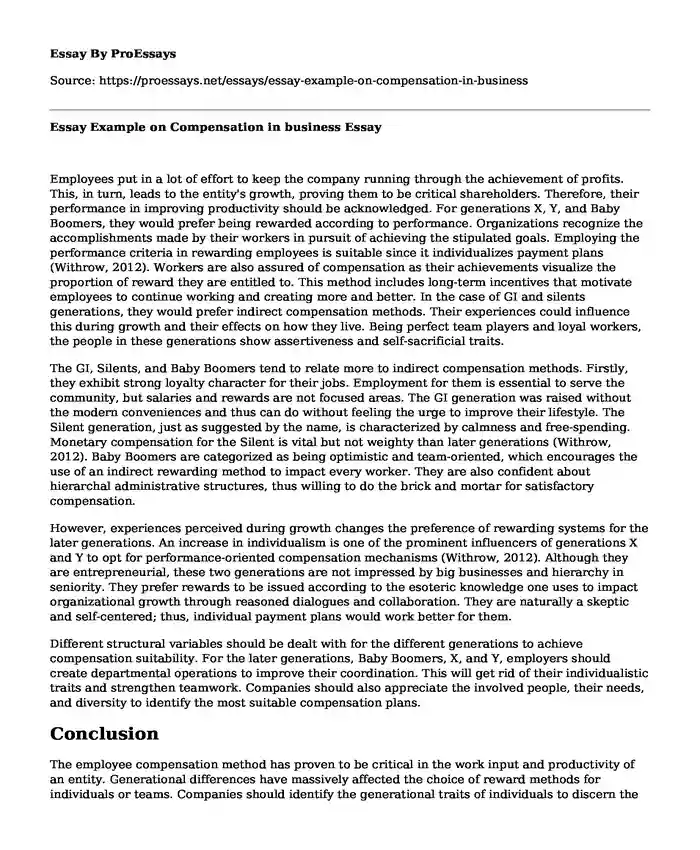Employees put in a lot of effort to keep the company running through the achievement of profits. This, in turn, leads to the entity's growth, proving them to be critical shareholders. Therefore, their performance in improving productivity should be acknowledged. For generations X, Y, and Baby Boomers, they would prefer being rewarded according to performance. Organizations recognize the accomplishments made by their workers in pursuit of achieving the stipulated goals. Employing the performance criteria in rewarding employees is suitable since it individualizes payment plans (Withrow, 2012). Workers are also assured of compensation as their achievements visualize the proportion of reward they are entitled to. This method includes long-term incentives that motivate employees to continue working and creating more and better. In the case of GI and silents generations, they would prefer indirect compensation methods. Their experiences could influence this during growth and their effects on how they live. Being perfect team players and loyal workers, the people in these generations show assertiveness and self-sacrificial traits.
The GI, Silents, and Baby Boomers tend to relate more to indirect compensation methods. Firstly, they exhibit strong loyalty character for their jobs. Employment for them is essential to serve the community, but salaries and rewards are not focused areas. The GI generation was raised without the modern conveniences and thus can do without feeling the urge to improve their lifestyle. The Silent generation, just as suggested by the name, is characterized by calmness and free-spending. Monetary compensation for the Silent is vital but not weighty than later generations (Withrow, 2012). Baby Boomers are categorized as being optimistic and team-oriented, which encourages the use of an indirect rewarding method to impact every worker. They are also confident about hierarchal administrative structures, thus willing to do the brick and mortar for satisfactory compensation.
However, experiences perceived during growth changes the preference of rewarding systems for the later generations. An increase in individualism is one of the prominent influencers of generations X and Y to opt for performance-oriented compensation mechanisms (Withrow, 2012). Although they are entrepreneurial, these two generations are not impressed by big businesses and hierarchy in seniority. They prefer rewards to be issued according to the esoteric knowledge one uses to impact organizational growth through reasoned dialogues and collaboration. They are naturally a skeptic and self-centered; thus, individual payment plans would work better for them.
Different structural variables should be dealt with for the different generations to achieve compensation suitability. For the later generations, Baby Boomers, X, and Y, employers should create departmental operations to improve their coordination. This will get rid of their individualistic traits and strengthen teamwork. Companies should also appreciate the involved people, their needs, and diversity to identify the most suitable compensation plans.
Conclusion
The employee compensation method has proven to be critical in the work input and productivity of an entity. Generational differences have massively affected the choice of reward methods for individuals or teams. Companies should identify the generational traits of individuals to discern the proper criteria for compensating them.
Bibliography
Withrow, J. R. (2012). Evaluation of the Impact of Generational Differences on Compensation in the Workforce. Northcentral University. http://search.proquest.com/openview/5c86a7d95aef40847f11b6c3b4d3f71d/1?pq-origsite=gscholar&cbl=18750&diss=y
Cite this page
Essay Example on Compensation in business. (2024, Jan 10). Retrieved from https://proessays.net/essays/essay-example-on-compensation-in-business
If you are the original author of this essay and no longer wish to have it published on the ProEssays website, please click below to request its removal:
- The Overview of the Performance Management Process - Paper Sample on Management
- How to Improve Employee Motivation Report Essay
- Paper Example on Entry of Multinational Companies in the Economy of Cyprus
- Self-Efficacy Beliefs Among Teachers in the Teaching Profession Paper Example
- Research Paper on Mexican Cuisine Thriving in Brooklyn: Joy Wood Chicken Tacos
- Essay Sample on My Role in Conflict: Growing Up and Growing Apart
- Essay Sample on The Talent of Employees: An Essential for Organizational Performance







